Would Tainted Funds from a New Part-Owner Spoil the Brooklyn Nets' Spirit?
C'mon, the #sportswashing began long ago. But it *would* be ironic for the libertarian Koch family to profit from eminent domain, sports subsidies, & NBA "socialism."
When news surfaced last month that Joe Tsai, owner of the Brooklyn Nets and the Barclays Center operating company, might sell a minority share to the family of the late libertarian/conservative activist David Koch, who with his brother Charles pushed national politics rightward, some were outraged.
After all, Koch, as The New Republic put it in 2019, was “particularly instrumental in legitimizing anti-government ideology.”
Most exercised was 33rd District Council Member Lincoln Restler, who represents Downtown Brooklyn near the project site. A member of the Council’s Progressive Caucus, Restler’s among those journalist Ross Barkan called “DSA-lite,” aligned with the Democratic Socialists of America.
“Oh Hell No,” tweeted Restler. “We gotta block the Koch brothers from getting involved in Brooklyn hoops. We don't need their conservative agenda tarnishing the spirit of our @BrooklynNets and @nyliberty.”
While Restler drew some applause, he also provoked pushback, with some saying it was none of his business.
Others cited David Koch’s significant charitable contributions, which include the David H. Koch Theater at Lincoln Center, or the David H. Koch Center for Cancer Care at Memorial Sloan Kettering.
The “spirit of the Nets”
To me, Adam Chasseur’s comment was on point: “And what is the spirit of the Nets, other than making lots and lots of money?”
(Flashback to Bruce Ratner’s recounting of his group’s purchase of the New Jersey Nets: “We were the highest bidder for the team. Like so many things in life, it was just a matter of money.”)
The pursuit of profit, with varying success (but ever-increasing ticket and concession prices), has involved a series of “Bond villain” owners (to quote a tweet below), each with his own taint, as well as the felonious bank Barclays, which bought naming rights to the Barclays Center.
So the #sportswashing began long ago. Those concerned with the ethics of the team’s owners and sponsor could have started then. Still, as discussed below, it’s a particular irony that the libertarian Koch family would profit from sports subsidies.
A series of “Bond villains?
Consider: original developer Bruce Ratner, as commenter Russell And Fro pointed out, leveraged his ownership of the New Jersey Nets to get the inside track on a key Brooklyn development site, including the use of eminent domain to acquire private property.
Ratner also wangled an override of zoning and $305 million in direct public subsidies, plus far more in tax breaks, cheap or below-cost land, and tax-exempt financing, the latter thanks to nominal public ownership of the arena.
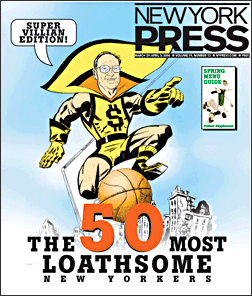
Ratner’s third act is as “developer and philanthropist.” Today there are far more loathsome characters in New York, much less in real estate.
The second team owner, Russian oligarch Mikhail Prokhorov, got rich during the post-Communist gold rush. As journalist Matt Taibbi later pointed out, to Russians, Prokhorov symbolized "when there were absolutely no rules." (More on him below.)
Yet Prokhorov successfully rehabilitated his image such that the New York Times Magazine put him on the cover, with the oxymoronic headline, “An Oligarch of Our Own.”
Prokhorov ran the Nets poorly, and unenthusiastically, but his seemingly endearing accent and well-prepared quips got him good press. A refinancing of arena bonds saved him, and future owners, big bucks.
Thanks to growing NBA revenues and the New York City location, Prokhorov cashed out by selling the team and arena company to Alibaba billionaire Tsai, a Taiwanese-Canadian educated in the USA, for around $3 billion. (Others reported $3.3 billion.)
Tsai seems an engaged owner, with his periodic courtside cheering and his recent efforts towards Koch-level charity. With his wife Clara Wu Tsai, Tsai gave to Lincoln Center, contributing $50 million to revamp what’s now the Wu Tsai Theater at David Geffen Hall.
A China apologist
However, Tsai made his fortune in China and, as ESPN explained, Brooklyn Nets owner Joe Tsai is the face of NBA's uneasy China relationship. So he’ll let profits trump ethics.
Tsai intervened on behalf of the league to ensure that the NBA maintained its cash cow, after Houston Rockets GM Daryl Morey tweeted: “Fight for Freedom. Stand with Hong Kong,” just before the Nets left for China for some lucrative exhibition games.
In the wake of Morey’s tweet, Tsai issued an open letter claiming China’s citizens “stand united," regarding the country’s territorial integrity.
Really? As New York Times columnist Li Yuan wrote last month, in the wake of the suspicious death of Russian dissident Alexsei Navalny:
The sad fact is that there’s no Chinese equivalent of Mr. Navalny because there’s no opposition party in China, and therefore no opposition leader.
It’s not for lack of trying. Many courageous Chinese stood up to the most powerful authoritarian government in the world. Since 2000, the nonprofit humanitarian organization Duihua has recorded the cases of 48,699 political prisoners in China, with 7,371 now in custody.
Incoming: the Koch family?
Now come the Kochs, perhaps most prominently 25-year-old David Koch Jr., who doesn’t have much of a political profile, but whose money surely comes with some taint.
Selling a slice at a reported $4.8 billion valuation would allow Tsai, who’s absorbed losses on the arena and sometimes on the team, to finally profit handsomely. So what if his politics, at least in Brooklyn, contrast with the Kochs.
In The Guardian in September 2018, regarding the Koch-funded Americans For Prosperity (AFP), three academics wrote:
AFP has quietly pushed behind the scenes for many of the most important conservative victories across the nation, including the anti-union bills that passed in former union strongholds such as Wisconsin, Michigan, and Ohio…. To succeed in electing conservative candidates and promoting right-leaning policy, then, AFP would need to hobble unions, especially those in the public-sector that were powerful state-level allies of Democrats.
…[T]he Koch network has racked up important victories across many policy areas, like stymieing the implementation of the Affordable Care Act (and especially the expansion of Medicaid to poor uninsured adults) in states like Missouri and Tennessee, rolling back state efforts to address climate change (for instance, in Kansas and West Virginia), and passing massive tax cuts for wealthy individuals and companies (as in Kansas and Oklahoma).
Koch funding has played a key role in the American Legislative Exchange Council (ALEC), which supplies model right-wing legislation to states, including voter ID laws and “stand your ground” statutes, as Politico noted.
The Koch brothers opposed Donald Trump in 2016, but then supplied his administration with people “from the vast network of donors and advocacy groups” they built, according to Politico. AFP in the current presidential race backed Nikki Haley, then pulled its funding to focus on Congressional races, battling “a Democratic Party captured by the progressive left.”
What about Barclays?
Beyond the owners of the team and arena company, what about Barclays? The bank’s a felon, admittedly so.
As I wrote in September 2015 for City & State, Barclays had agreed to plead guilty to a felony charge of conspiring to fix prices and rig bids for dollars and euros in the foreign exchange spot market, according to the U.S. Justice Department. The bank agreed to pay a criminal fine of $650 million.
Barclays paid far more in civil fines, with a total outlay of $2.4 billion.
“Put simply, Barclays employees helped rig the foreign exchange market,” declared Benjamin Lawsky, then superintendent of New York State’s Department of Financial Services. “They engaged in a brazen ‘heads I win, tails you lose’ scheme to rip off their clients.”
Indeed, as one banking executive bragged in a chat unearthed by regulators, “if you ain’t cheating, you ain’t trying.”
Is that not the spirit of the Nets and Atlantic Yards?
Still, while bankrupt crypto scam company FTX saw its name erased from the Miami Arena last year, financially robust Barclays, less fundamentally a scam but tainted enough to be criminal, remains unscathed.
Teams: corporations or public trusts?
Restler’s response reflected a sense that the team embodies the spirit of a local community. That’s more acute, I suspect, in smaller cities, where the team may play an outsize role in community identity.
Consider the NFL’s Green Bay Packers, in a far smaller market, where anomalous fan ownership does make the team more of a public trust.
It also depends, at least in part, on the longevity of the team—and the constraints on commerce.
In other words, when players were contractually bound to the Brooklyn Dodgers, and baseball wasn’t yet a huge business, the individual Dodgers were considered part of Brooklyn.
The NBA’s another story, especially in the era of player empowerment, where stars change teams regularly.
So Jerry Seinfeld’s observation, “You’re actually rooting for the clothes,” remains true.
A huge cast of players have worn the Brooklyn Nets uniform.
So it’s wiser to think about teams as “sports entertainment corporations,” in the piquant phrase of subsidy skeptic Bettina Damiani.
The Koch-ian irony
Still, it would be a tremendous irony to see Brooklyn’s “sports entertainment corporation” controlled, even in part, by Koch money.
After all, the libertarian philosophy behind the family fortune argued against all the direct and indirect public assistance that enabled the arena.
Consider: David Koch served on the board of the Cato Institute, a libertarian think tank for nearly 30 years. As Jane Mayer wrote in her August 2010 profile of brothers David and Charles Koch, they funded Cato’s launch:
According to the Center for Public Integrity, between 1986 and 1993 the Koch family gave eleven million dollars to the institute. Today, Cato has more than a hundred full-time employees, and its experts and policy papers are widely quoted and respected by the mainstream media. It describes itself as nonpartisan, and its scholars have at times been critical of both parties. But it has consistently pushed for corporate tax cuts, reductions in social services, and laissez-faire environmental policies.
The Cato Institute also opposes the polices that led to the development of the Barclays Center and the Nets’ move to Brooklyn.
Cato arena opposition
Consider the following Cato publications.
From Sports Pork: The Costly Relationship between Major League Sports and Government, April 1999:
Before the Great Depression, sports subsidies were rare; today, they are the general rule. The economic facts, however, do not support the position that professional sports teams should receive taxpayer subsidies. The lone beneficiaries of sports subsidies are team owners and players….
A step in the right direction would be a measure requiring voters to approve any government subsidy for professional sports.
From The Nets Finally Win! [a court case enabling eminent domain for the arena], Nov. 2009:
Given the high‐profile nature of the would‐be new tenants of the land, this is the most famous property rights case currently being litigated, but it’s the same ol’ story: rich company wants land on the cheap, company gets the government to seize the land, property owners lose their land for the benefit of another private party for a decidedly not public use.
From The Eternal Recurrence of Eminent Domain Abuse, Oct. 2011:
Other groups are shedding light to the rampant eminent domain abuse across the country. The Moving Picture Institute recently released the Battle for Brooklyn, a critically acclaimed documentary telling the story of a neighborhood’s struggle against a redevelopment plan in Brooklyn.
The “socialist” NBA
Then again, billionaires don’t get to be billionaires without knowing the territory, and the NBA, despite skyrocketing valuations, is a solid business.
After all, NBA rules—including revenue sharing, salary caps, and the drafts—help ensure financial parity. As Tsai has said, “It’s kind of a socialist setup. Basically all 30 teams get to make money.”
Such "socialism" is actually quite capitalistic. After all, the league's a cartel, and the absence of competition means teams can muscle home cities/states for arena assistance. In a real socialist setup, the teams would share profits with the public.
The NBA’s problematic billionaires
It’s worth noting that the NBA already has a long list of ethically dubious billionaires, as TrueHoop’s Henry Abbott has written.
Here’s one excerpt, which otherwise is paywalled:
There was a time that no American banker would deal with Donald Trump, except Rosemary Vrablic at Deutsche Bank. Vrablic keeps a short list of clients. The Mortgage Observer identified only one who’d discuss this magical banker: Pacers owner Herb Simon…
76ers owners Joshua Harris and David Blitzer work at Apollo Global Management and Blackstone Group, respectively. Both firms have done big deals with Jared Kushner’s family real estate business. And both firms’ founders advise the Russia Direct Investment Fund (RDIF)...
One of the Russia Direct Investment Fund’s biggest investments, the Alibaba group, was co-founded by incoming Nets owner Joe Tsai, the man who is purchasing the Nets from Prokhorov.
What about Prokhorov?
As I wrote in May 2019, distilling Abbott’s series on Prokhorov, he leaves us with the lingering sense that much about Prokhorov is "tricky," tough to truly suss out, but shrouded with questions and whiffs of impropriety. And that means that the NBA didn't do a serious job vetting the new owner with the deep pockets.
Wrote Abbott:
The takeaway can only be that it takes a lot to be precluded from NBA ownership. Prokhorov’s close business associates and businesses star in episodes that must have raised eyebrows.
Those include (quoting Abbott):
The tax fraud that resulted in the incarceration and death of Sergey Magnitsky
The collapse of the Russian aerospace industry
A missing investment banker
Interwoven business histories with people and entities alleged to have been involved in Russian efforts to influence the 2016 U.S. presidential elections
Interwoven business histories with alleged leaders of organized crime
Other questionable owners
TrueHoop has published much more, including The sports world whiffs on China, Russia's money: a timeline, and Fertitta family history.
The Nation’s Dave Zirin in October 2202 wrote If the NBA Stands for Racial Justice, What About Tom Gores?. with the sub-heading, “The franchise owner of the Detroit Pistons also owns a predatory prison telephone company. Shouldn’t that matter to the NBA?”
The problem, of course, is true beyond the NBA. Lots of sports team owners made their money, or even operate, in less than savory ways.
Other considerations: philanthropy
Should Tsai, or the Koch family, get a pass because of substantial charitable contributions?
Of course not. Charitable generosity is often a win-win, hardly painful for the mega-wealthy while allowing them to save on taxes and direct their spending to not the public interest, as with taxes, but a charity that also will buff their reputation.
Consider this account from New York Times columnist Ginia Bellafante:
A few days before it was announced that a former professor at Albert Einstein College of Medicine in the Bronx was giving the school $1 billion to ensure free tuition pretty much forever, came word of another significant donation, though one not nearly as astonishing in sum or association. Julia Koch, one of the richest women in the world, was giving $75 million to a medical center in West Palm Beach, which, as The Chronicle of Philanthropy noted, serves “one of Florida’s fastest-growing wealthy enclaves.”
Koch, David’s widow, will see her name on the Julia Koch Family Ambulatory Care Center. By contrast, the billionaire giving to Einstein, Ruth Gottesman, will eschew such naming rights, recognizing the eminence of the current honoree.
As Timothy Schwab, author of The Bill Gates Problem, has observed, “There are virtually no checks and balances when it comes to private philanthropy and few meaningful requirements around transparency."
Social Justice and the Nets
In the wake of the 2020 Black Lives Matter protests, Tsai even pledged $50 million over ten years for a Social Justice Fund. Still, that’s far less than, say, the annual tax exemption for the arena, now north of $110 million.
Heck, even that Social Justice Fund can’t avoid promoting the Nets when renovating a playground.
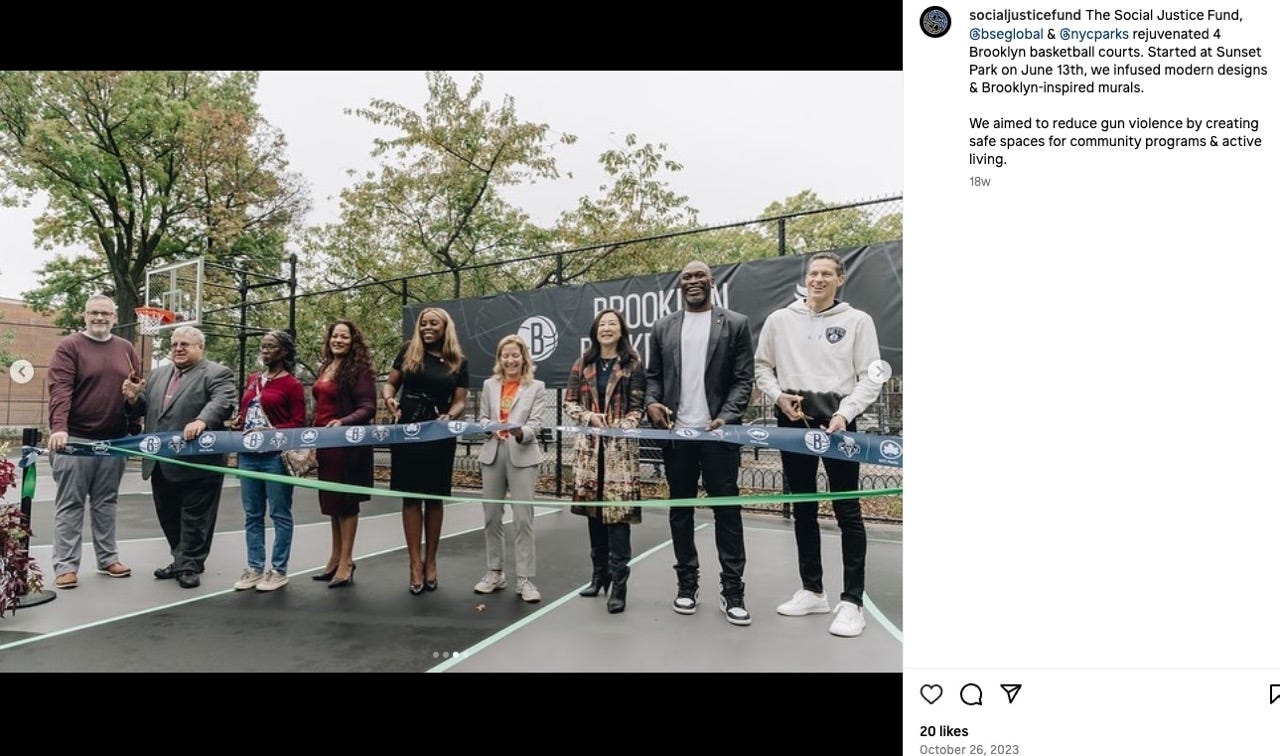
Other considerations: stealth takeover
Would the owner of 10% to 15% of the team control Nets and policy? No.
Who knows, maybe David Koch Jr. just wants to sit in the owners’ box. Remember, as Jay-Z once said, NBA teams are like paintings for billionaires?
Would he be using it as a start to ultimately buy Tsai out? That can’t be dismissed.
Reports—again, unsourced—have suggested that Koch could be using it as the gateway to the purchase of a different team. Then he’d have to sell that Nets share, however.
Footnote: Koch in the Atlantic Yards legal history
A few who went down the Atlantic Yards rabbit hole might remember a Koch reference, in an August 2008 brief filed by the Empire State Development Corporation (ESDC, now simply Empire State Development), opposing an appeal, by Brooklyn community groups, of a state judge’s unwillingness to invalidate the project’s environmental review.
With bafflingly obduracy, the ESDC contended:
Appellants labor to fortify their argument by calling the Arena the “Barclays Center.” There is no record evidence that this name will be used, although this name has been reported in the press. In any event, the name of the facility does not change its civic character. The New York State Theater at Lincoln Center will not cease to be the cultural facility it has been since its creation simply because a captain of industry recently purchased the naming rights for $100 million.
First, the name Barclays Center had been announced by the developer and the mayor at a public event. It wasn’t an unsourced leak to the press.
Moreover, David Koch hadn't bought "naming rights," at least not the way Barclays did, promising a stream of payments over 20 years and gaining big honking signs on the arena roof and its exterior.
Rather, he'd made a donation to a cultural institution, which then honored him, somewhat more decorously, in return. Such #artswashing is not quite #sportwashing, but it’s not far off.

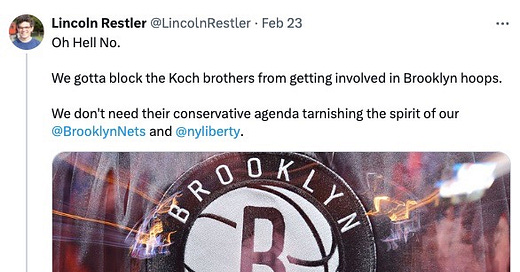




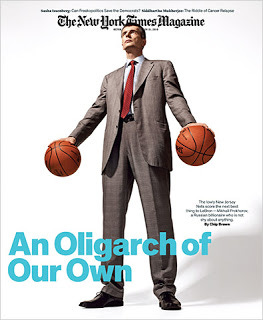

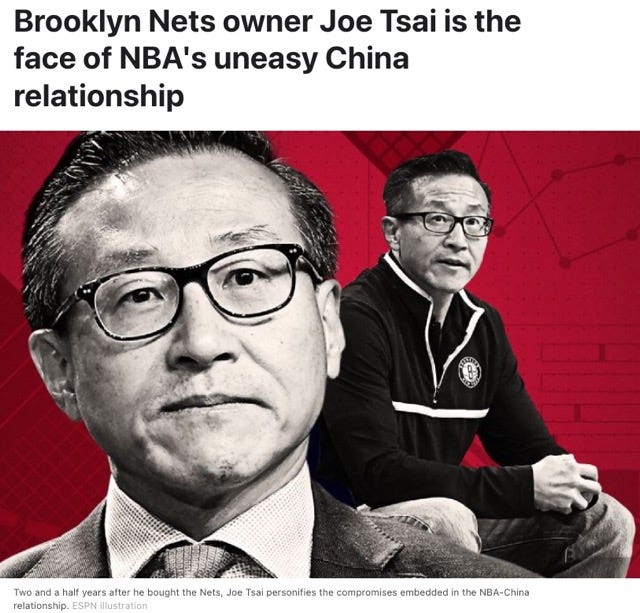

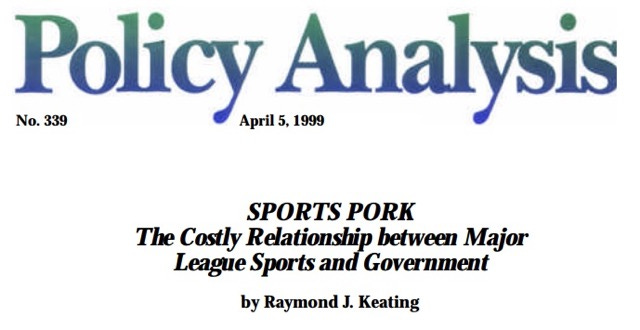
Truly fascinating how the trail of owners descends into a Hall of Fame of reprehensible characters. And equally interesting how the ownership of NY sports teams in general tend to polarize among long-standing established groups (Maras, Steinbrenners), cartoonish villains, and incompetent clown shows (Wilpons, every Islander owner), with the Dolan and Woody Johnson regimes straddling the middle.